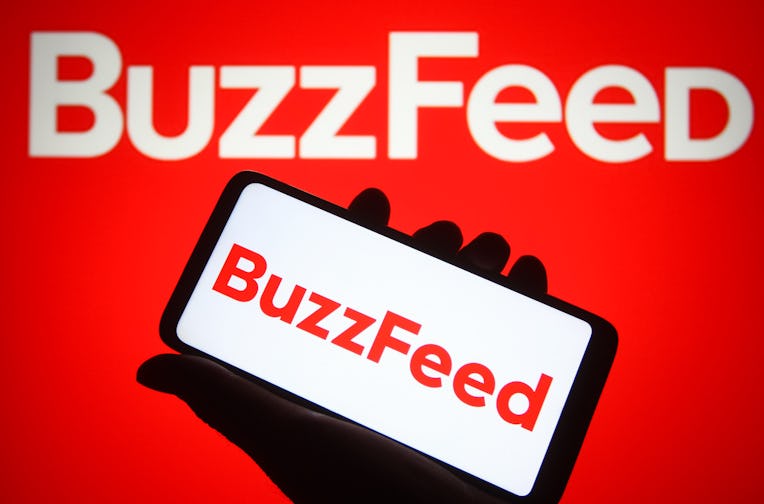BuzzFeed Wants To Rebrand As “News For Gen Z”
After announcing staff cuts targeted at their investigations, politics, science, and inequality teams

In March, BuzzFeed News started offering voluntary buyouts to staff reporters, with the goal of reducing its 100-odd-person staff by somewhere between 25 and 50 people (Vanity Fair recently estimated about 30 roles). The losses will be targeted toward some of BuzzFeed’s newsiest desks: investigations, science, politics, and inequality. Those teams, unlike colleagues on other teams, are “100 percent” eligible for exit packages. By July 1, in other words, they could all be eliminated.
That might seem like a bad sign for BuzzFeed’s news coverage. A spokesperson for BuzzFeed denied that the company planned to “pivot away from those subjects,” but some employees interpreted it as such. “That's a really clear message, right?” said politics reporter and BuzzFeed News Union chair Addy Baird, about the targeted buyouts. “It’s like ‘We don't care about you. We don't want you here.’ It's a threat, in some way — if you don't fit in in the future, maybe we’ll just flat-out lay you off for less money.” Baird herself took a buyout earlier this month.
But sources close to the company said that BuzzFeed News has a plan to court profitability — the lack of which led to the cuts — while continuing to cover news. Their plan is to rebrand as “news for Gen Z.”
News for Gen Z. Gen Z-centered news. Current events for youth born after 1997. What does that mean? It’s presently hard to say. Gawker reached out to BuzzFeed with several questions, some of which a spokesperson answered. He did not address the one where we asked what “news for Gen Z” means. We followed up asking to “hear more about the company’s plan to cover news for Gen Z,” such as “what does that mean?” He later responded: “Our audience is Gen Z and Millennials. We write for our audience and are going to continue doing that.”
BuzzFeed’s own staff isn’t entirely clear on the endgame either. “I don't think that anyone in BuzzFeed leadership has spoken to a 17-year-old, understands what they are interested in or what they think of BuzzFeed,” Baird said. “Gen Z thinks [BuzzFeed] is for Millennials on Facebook — to reorient your entire strategy around these people who don't even really give a shit about you is also baffling to me.”
When asked about the plan, Baird said, managers have been vague. The newsroom has been operating without a permanent top editor since its outgoing EIC Mark Schoofs stepped down when the cuts were first announced. His two deputies, Tom Namako and Ariel Kaminer, soon followed. The question of interpreting “news for Gen Z” will be up to Schoofs’s replacement, who has yet to be announced. Peretti and interim EIC Sam Henig are conducting the search which, according to BuzzFeed, has narrowed to a handful of internal and external candidates. They have each submitted memos about their plans; what any one proposed is a guessing game. But according to the Glassdoor listing, the new editor must “care about the issues that activate a Gen Z and Millennial audience,” so presumably the memos involved “news for Gen Z.”
Here is what we do know: On BuzzFeed’s investor relations website, they boast that the site is “#1 in time spent among Gen Z and Millennials.” That data point comes from the Comscore Media Metrix, an audience measurement service and BuzzFeed partner, and was drawn from an idiosyncratic metric called “Time Spent,” which requires this disclosure in a footnote: “Our definition of Time Spent is not based on any standardized industry methodology and is not necessarily defined in the same manner or comparable to similarly titled measures presented by other companies.”
So BuzzFeed may or may not be “#1 in time spent among Gen Z and Millennials” by other standards, but they are apparently trying. Last summer, for example, Peretti wrote a blog post about BuzzFeed’s “next chapter” — a significant part of which would entail “empower[ing] Creators” and capturing “digital creativity.” The blog wasn’t especially clear about what that meant:
Digital creativity is the biggest force shaping our collective future. The big tech platforms don’t understand content creation or know how to support digital creativity…BuzzFeed lives at the intersection of technology and creativity, we are perfectly positioned to empower the next generation of creators.
But in April, the company announced one creator-empowering project: Catalyst, “a new, unified Creators network,” that will “support and work with creators across every category” and “seek to double the size of BuzzFeed, Inc.’s creator network” this year. Sounds Gen Z enough, though BuzzFeed’s spokesperson said the program was “totally unrelated to BuzzFeed News (or HuffPost).” But the newsroom does, he said, “do deep coverage of the creator economy and will continue to do that.”
In any case, the same press release also debuted a new awards event called “19 Under 20,” that will be “hosted by celebrity judges.” In the announcement, BuzzFeed promised this would “celebrate the brightest Gen Z minds in Sustainability, Activism, Innovation, and Business.”
Whatever news for Gen Z is, it will involve significantly diminished or eliminated investigations, politics, science, and inequality coverage. Seems like a good plan — they famously don’t care about any of those things.